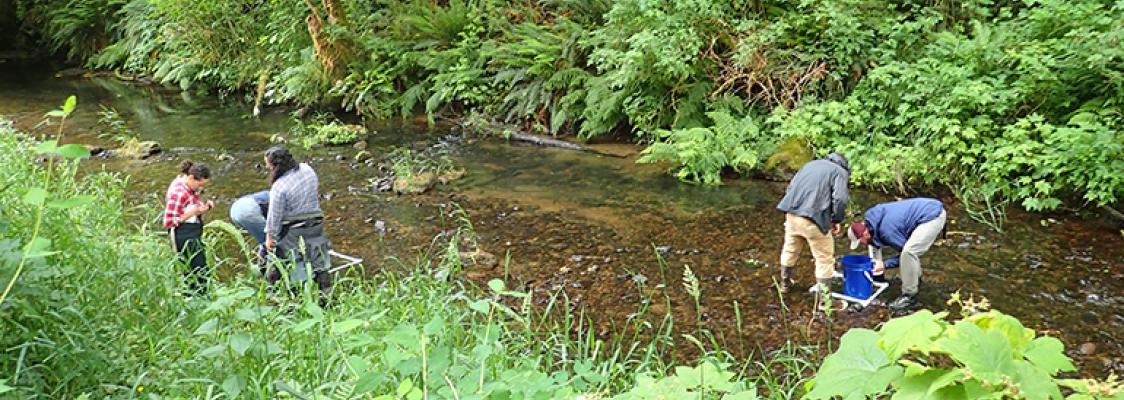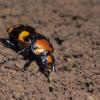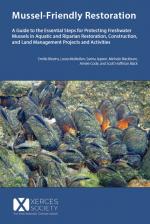Dams and other barriers that restrict movement of host plants and alter water levels.
Water diversions that alter streamflow and function.
Changes to precipitation amounts and warming waters caused by climate change.
Exposure to toxic chemicals and general degradation of freshwater ecosystems.
You may wonder why freshwater mussels are so imperiled, especially compared to other species. Destruction of habitat has been one of the biggest impacts to freshwater mussels, including the construction of dams that have altered how rivers flow and function. Water diversions for human uses that decrease streamflow, combined with warming waters and changing precipitation patterns that result from a changing climate, have also and will continue to threaten mussel populations (for more information, see our analysis of potential climate refugia in Pacific Northwest watersheds in the report, Opportunities for Freshwater Mussel Conservation in the Pacific Northwest and Intermountain West in a Changing Climate). Pollution and toxic chemicals also impact mussels, which can be especially sensitive to certain contaminants. The same characteristics that have made them so valuable to protecting our water quality (sedentary nature, ability to reach high density, and filtering lifestyle), also make them vulnerable to a wide range of stressors to which they may ultimately succumb. The introduction of invasive species, impacts to host fish populations, and other impacts to aquatic habitat, also all likely play a role.
Globally, there may be as many as 17,000 species of freshwater mollusks (including snails and clams as well as freshwater mussels). Many of these species have not been described (meaning they have not been given a formal scientific name, and more specific details about identification or their habitats and life history have not been published). Of the ones that have, we often know very little about their conservation status—how many animals there are, how widely distributed they are, whether our activities have reduced population sizes or affected where they are found.
One tool we can use to assess the conservation status of these species is the IUCN Red List. This database includes global assessments of species’ conservation statuses. Among freshwater mussel species found all over the world, it is estimated that 45% of the assessed species are “near threatened” or “threatened” with extinction or are already extinct. North America is home to about 300 species of freshwater mussels and it is estimated that 35 or more of those species are already extinct.
Our vision is for a future where water bodies contain healthy, diverse, and abundant freshwater mussel populations. We collaborate with and provide tools to multiple partners – including tribes, researchers, restoration practitioners, and watershed stewards – to identify, understand, protect, appropriately manage, and restore freshwater mussel populations.
While freshwater mussels are imperiled throughout North America, we focus the majority of our attention on western species, which have been less well researched and who face unique conservation challenges. Below you'll find a summary of the conservation efforts we're engaged in.
Restoration Partnerships and Outreach
Restoration projects have the potential to improve mussel habitat, but mussels can be sensitive to management and construction activities. We work with partners to improve aquatic restoration efforts to protect freshwater mussels, by assisting with pre-project surveys, providing guidance for restoration designs, and coordinating salvage and relocation efforts. Check out Conserving the Gems of Our Waters, our guide to best management practices, for more information!
Data Collection and Coordination Efforts
Effective conservation strategies are built on a solid foundation of data and information. Our partnership with the Confederated Tribes of the Umatilla Indian Reservation has grown a database of thousands of freshwater mussel observation records. This Western Freshwater Mussel Database is only possible through the contributions of many individuals and institutions, who generously share survey records, research, and observations. By collaborating to build and populate this database, Xerces and our partners are able to improve research, monitoring, and conservation efforts.
Please also consider sharing your observation data with us, including any observations you may have of mussel die-offs. Your contributions can help ensure that mussel conservation efforts are focused and effective.
Research and Monitoring
Western freshwater mussels are an understudied group of species. Recent efforts by researchers in the West have expanded our understanding of host fish, population viability, and the ecological role of mussels in aquatic habitats. Still, many basic biological, ecological, and management questions remain unanswered, and freshwater mussels have been underutilized as tools to assess the health of aquatic ecosystems. We are working with researchers and organizations to advance research and monitoring efforts to improve the “state of knowledge” of western mussels. Please get in touch if you are interested to learn more!













